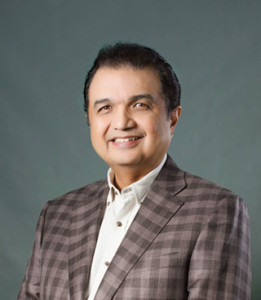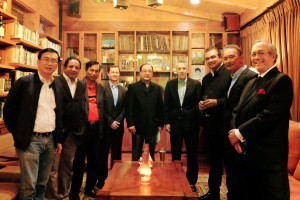NOT many people had the honor of sitting behind the desk of a company chief executive at age 25, but Robert John L. Sobrepeña had the privilege of doing so.
It was not a grand office. After all, his company was still at its budding stage in 1980. The quaint office inside a conference room in Ortigas saw Bob, as his friends and family fondly call him, managing a newly minted property development company.
 Fast-forward three decades later. The businessman sits comfortably inside a cozy executive room, filled with documents related to his enterprises, as he recalls the memories of his life as a 25-year-old chief executive.
Fast-forward three decades later. The businessman sits comfortably inside a cozy executive room, filled with documents related to his enterprises, as he recalls the memories of his life as a 25-year-old chief executive.
“The year 1980 was quite a year for me. I was actually about to graduate from school when I was 25. I was engaged and was making preparations for my wedding. At the same time, I was putting up Fil-Estate,” he said. “That was quite a busy year with all those things happening. Somehow, I managed.”
Setting up Fil-Estate, a listed property company, was not easy. Bob recounts that he had to literally work just to make his firm a success and, at the same time, spend time with his family.
“Putting up my businesses demanded the most of my time. The good thing was I got married, and we had our honeymoon—that was a breather. But after that was all work. I was president at a very young age. We had big projects at that time, and it was quite challenging and so it required all my time,” he said.
His property business started with the development of the Town and Country Executive Village in Antipolo City, the very first subdivision along Marcos Highway.
“It went excellent. We literally took off from our first day. I didn’t have an office. My father had a membership in a business club here in the Ortigas area. I asked his permission to use the conference room for a week as a temporary office. We stayed there for a month and, eventually, we were kicked out,” Bob said, smiling as he told the story.
He had more than 100 agents, and sold P1 million in property a day.
“Our first month with P30 million was successful already. Hence, I needed a big office with low rent. We moved in to our first office at the top floor of the Agora Market, and had that as our office for several years. We were literally on top of the market,” he said.
From there, what was then a profit of P30 million ballooned to P100 million, until it reached the P1-billion mark.
“It all came from there. When I think back, that year was when it all started,” Bob said.
Walking along Edsa
THE concept of setting up his own real-estate company stemmed from his stint as a marketing director for VV Soliven, a property company that he bumped into while he was scouting for clients along Edsa as a sales person.
“I worked with John Clements as a consultant. There, I learned most of what I am now. It was probably one of the lowest paying job offers without a car plan, no perks and compensation largely came from commissions. In retrospect, what attracted me to it was I could learn more and grow faster and enrich myself. Not so much for the money, but for what I could learn,” he said.
He was able to make money out of the commission structure, and became one of the top sales persons in the company.
“I would see 15 to 20 people a day, working easily for 12 to 15 hours. I started from Edsa all the way to the end of Roxas Boulevard. I remember their gates, security guards—some of them threw me out,” Bob recalled. “Along Edsa is where I bumped into VV Soliven. He was one of my calls. They hired me. And that’s where the concept of setting up my own company started.”
Bob said his stint at VV Soliven taught him the ropes of business management in the real-estate industry. His job also allowed him to see the areas where he could improve on before setting up his own company.
“There are three basic necessities in life; shelter is one of them. I wanted to do work in one of the basic necessities. I could have gotten into the food business, but I was thinking that I wanted it to be in the lines of something more tangible, like housing,” he said.
From there, he talked to investors and convinced architects and developers for his first project.
The executive admitted that doing so was not an easy task, but he was able to manage, thanks to his wife, Melissa.
“The biggest jump in my career was from being employed to setting up my own company. Good thing that I have my wife,” he said.
Betterment of life
BOB is one of the most controversial figures in the Philippine business arena. He figured in several issues, including the most recent mess with the government on the ownership of Camp John Hay in Baguio City.
However, many people are not aware that the businessman started his businesses with the intention of helping people have a better life, his inspiration being Roselam Sobrepeña, his mother who is extremely active in social causes.
“I have always dreamt of being a businessman and being successful in running my own company—using that to not only gain material things and live with some comfort, but using it to do meaningful projects that could somehow improve things around and even help the country,” Bob said.
He lived up to that by building housing projects and by constructing the Metro Rail Transit (MRT) Line 3.
“I lived up to that, but with great frustrations. If we have the right president this time, we could do that and we could do more,” he said, referring to the present state of the train system that runs along Edsa, a feat that he never had the chance of imagining in a lifetime, but he did it anyway.
Bob believes that, by doing what he has done, he has left an imprint in the lives of the Filipino people. For instance, he built the MRT 16 years ago to clear up Edsa from the kilometric lines of people waiting for buses.
“We go through life and what matter most are the good things we have done. As you live your life, you have to devote it to doing things that are good. Personally, the MRT is a frustration. It should be helping 1.2 million passengers a day. It should have improved the quality of life of Filipinos,” he said.
“We are just custodians. In that sense, we don’t really own anything. The only meaningful thing really is the good that you do. I strive to keep those things.”
Things that have yet to be done
HE might have earned a lot from his businesses and had helped many Filipinos in the process, but for Bob, the job of improving the lives of his fellow citizens goes on.
“I would like to finish the work that I have done, such as the MRT and other projects. I would like to see that all done in the next five to 10 years,” he said.
There are many things that can be done to the train system that ferries half-a-million passengers per day. And despite all the tussle with the government with how to move forward with improving the railway line, Bob is still hopeful that the facility will be fixed soon to take away one of his frustrations in life.
Looking back, he said, he was astonished at his life. His eyes glistened as he recalled how he was able to stand up on his feet and attain special feats in life.
“I had hoped to be successful in one area and, perhaps, do well in that area and, hopefully, do good enough to return it somehow. But I never really thought that it will go to this level. When I think back about it now, it’s quite astonishing that everything was done and accomplished. But while I was doing it, I was just too focused on the task at hand. It was so consuming that I never really had the time to appreciate it, especially a 17-kilometer train over Edsa. Looking back now, that was quite a feat. It could have only happened with the energy of a very young person,” Bob said.
With all these experiences now under his belt, he believes that the present 60-year-old Bob is much more mature than the 25-year-old Bob who just dreamt of building his own company.
“There’s a lot more wisdom in the Bob now, having all the experience that I had gone through. One thing that remains the same is my being positive. I have always looked for the positive things in life and not dwell on the negative things. I would rather think of the solution instead of the problem,” he said. “I have the optimism and positive mind frame, couple that with the fact that I could always figure out problems and solutions. I’ve become a lot more serious now.”
It’s payback time
WHEN he retires, hopefully in the next decade, he wants to spend most of his time with his family and doing charity work.
“I’ve always had time for my family even through my busy schedules. We would always take two weeks or three weeks off a year together and travel, so my seven children grew up traveling. We have been doing that for a long time with my wife and family. I would like to continue that once my schedule is less crammed,” he said.
Bob plans on going to the ancient cities when he retires. He said he has always been fascinated by culture, history and people.
Along with his plans for his family, Bob also plans to continue the legacy of his mother in the field of charity.
“As we grow older, we are fortunate enough to be given the ability to give back. So, it’s called payback time. Those years you should spend to find a way to give back to people who probably need more. As you grow older, you could probably think of areas to focus on helping other people more. To me, these areas are in education, health and job creation,” Bob said.





